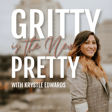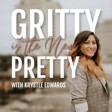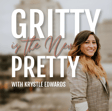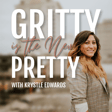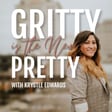Become a Creator today!Start creating today - Share your story with the world!
Start for free
00:00:00
00:00:01

19. Dona Ponepinto, CEO of United Way Pierce County
Dona is currently the President and CEO for United Way of Pierce County. She is active with United Way at both the state and national level where she has served as the chair for the United Ways of the Pacific Northwest and is a past co-chair of the Black Professionals Leadership Alliance, made up of United Way CEOs from across the country. Dona has consistently been very engaged in her community and has demonstrated strong leadership through service and board membership. She is a member of the Junior League Tacoma and is currently the President of the Association of Junior Leagues International.
Join us as we discuss:
- United Way's Mission
- What a CEO Does
- Importance of Women Mentorship
Transcript
Podcast Introduction and Guest Introduction
00:00:02
Speaker
Welcome to Gritty is the New Pretty, a podcast by Grit City Women. On episode 19, we are featuring Donna Ponapinto, CEO of United Way Pierce County. Looking for ways to support Grit City Women and keep these podcasts going? Visit our online store at gritcitywomen.com. Welcome Donna. Good afternoon. Good to be here.
00:00:29
Speaker
Thank you so much for joining us today. Would you go ahead and start off with telling us a little bit about yourself? I'm Donna Panepinto and I'm the President and CEO of United Way Pierce County in Tacoma, Washington. I've been here 10 years. It was 10 years as of January.
00:00:47
Speaker
And just as someone who came into this community really interested in how do you work with others within a community to make change happen.
00:01:02
Speaker
And that's always something that I've been committed to in all four of the United Ways that I've worked in for the last 36 years is improving lives, mobilizing, bringing people together to really tackle issues that we all care about.
Volunteer Work and Professional Alignment
00:01:21
Speaker
And I think United Way's role as that convener, that catalyst makes
00:01:28
Speaker
really helps to drive so many things that happen in communities. So that's my work life. And then my volunteer life very much aligns with a lot of the work that I have done over the years with United Way. And I consider myself a community volunteer. I've been volunteering since I was probably in elementary school, doing all sorts of things. And I've just always felt that it's important to give back.
00:01:57
Speaker
and between volunteering and working for United Way. That's about all the time I have and get some sleep in between. Well, congratulations on 10 years. That's incredible. And thank you for all the work that you do in the community service.
00:02:16
Speaker
That's something that's really important to me as well. And I see a lot of value in that. So I'm excited to kind of talk about that more with you.
United Way’s Mission and Community Role
00:02:23
Speaker
Do you want to go ahead and give us a rundown on what United Way does? So United Way and you know, what's interesting about just that question is that there's so many people that don't know what we do. Yeah, they recognize the logo.
00:02:39
Speaker
They know that in the past we had commercials with the NFL, but we obviously do so much more than that. Our United Way has been around over a hundred years, the Pierce County United Way, over a hundred years. And as I had mentioned, our mission is really about mobilizing and uniting the community, the power that's in community to bring that power together
00:03:07
Speaker
in order to tackle and address those issues that are critical within our respective communities and do that in measurable and lasting ways. And so our main role as a United Way is not necessarily about direct service.
00:03:24
Speaker
One of the things that we do is convene, bringing people together. It gives us a platform where people can share ideas, come up with solutions, and then execute on those solutions.
00:03:41
Speaker
So that's a big part of what we do. We also put a lot of investments. So we raise money, right? United Way, but we're more than just a funder fundraiser. Traditionally, years and years ago, United Way raised money. They put money back out into the community.
00:03:58
Speaker
You know, we raise money now, focus on very specific areas. So our United Way has a goal of lifting 15,000 households out of poverty by 2028. And as of today, with all the investments that we have put out into the community since 2016, 2017,
00:04:18
Speaker
About 7,800 individuals and families have moved from a place of crisis to self-sufficiency. So we're very much about poverty reduction at our United Way and ensuring that people are moving from this place of crisis to not just self-sufficiency, but beyond. Because we know if you're self-sufficient, that's not enough.
00:04:42
Speaker
And our United Way, as many United Ways now across the country, are focused on a population called Alice, asset limited, income constrained, employed. Folks that are getting up every single day, many times working more than one job and still can't make ends meet. And our United Way is saying, how do we ensure that those Alice families
00:05:13
Speaker
don't fall into that safety net, that they are stable, that they stay in their housing, they have access to supports in order to be able to take care of themselves and their families. Now, Alice families are between 100 and 200% of poverty level.
00:05:31
Speaker
If you're 101% of the federal poverty level, you're still struggling. For a family of four here in Pierce County, that is 200% of poverty level is around 56, $60,000 a year, $60,000 a year. When you think about it, it's not a lot of money if you're a family of four trying to
00:05:56
Speaker
take care of childcare, put food on the table, pay your bills. You are one emergency away of being in a major crisis. So we pull together partners to try to figure out, all right, so how do we tackle some of these issues so that those families are stable?
Programs and Initiatives for Poverty Reduction
00:06:21
Speaker
Can you give us some examples of things that you do with families that help them get above that poverty level and out of the Alice area? So we help Alice families in three ways. Basic needs. We have some resources that we put that we're funding right now 21 agencies.
00:06:41
Speaker
and they are committed to tracking information that helps them and their clients be able to say, all right, where are you on this continuum of moving towards self-sufficiency? So those basic need agencies are really committed to not just providing one service to those families, but how are we really helping this family get on a path?
00:07:07
Speaker
So that's one thing. And then our 211, our call center, it's a free call line and individuals can call and get information. We get about 80,000 contacts a year into our call center. But what is unique about our call center is that we have what's called navigators. And these navigators are going to spend more time with a family or an individual calling if they need help with
00:07:35
Speaker
job seekers, for instance, then R211 is a common referral in partnership with Workforce Central and all of their partners. And a job seeker will call into United Way, our navigator will help make sure that they get connected to the right
00:07:57
Speaker
agency that's partnering with Workforce Central and vice versa. So once that person is working with that particular agency, they stay in touch. They're making sure that those clients are getting the supports that they need to be successful. And we have workforce, we have transportation navigators, we have behavioral health navigators, as well as the
00:08:26
Speaker
we have navigators that help with housing, working with all of the housing agencies. The challenge is that as more we do navigation, it becomes less of a two minute phone call and more of a 30 minute, 40 minute phone call, which has its challenges as well. So working on all of that, but I would say that we're different in many respects because we are
00:08:55
Speaker
putting more time into talking to one person and making sure that they feel like at the end of that call that they're getting connected to the right kind of support and they know that they're going to get some follow up as well. So you've got two on one, then you have our Centers for Strong Families. And our Centers for Strong Families started in 2017, 2016, the first two, we have seven now,
00:09:24
Speaker
and hopefully going on eight centers. And these, it's a network. United Way is the intermediary. And those seven organizations are providing three different kinds of supports. Employment coaching and training, income support. So are people leaving resources on the table? Are they not accessing public benefits or private benefits? And then the employment coaching and counseling.
00:09:52
Speaker
because we know that having a job is not enough. You can have a job and not have all of these other supports, and you're still going to be struggling. So the idea with this is this integrated and bundled approach to helping individuals increase their income, decrease debt, and improve their credit scores. And it's a national model. So we are a part of a national network
00:10:20
Speaker
of five of a hundred, I should say, financial opportunity centers. And our role is to not only just provide some funding, but our role is provide technical assistance.
00:10:34
Speaker
It is to provide the data mechanism for them to collect all of this data and to provide other kinds of supports that they would need as well as we provide a vehicle to bring additional dollars into the county for this work. And we're seeing great progress to date over 3,500 centers for Strong Families clients have been seen. You have, you know, average monthly wages around $21 an hour.
00:11:04
Speaker
average monthly increase in income. On average right now is about $1,200 a month. And if you're a family of four or five and you are challenged with not being able to save, you've got all these other things going on, making really tough decisions for your family,
00:11:24
Speaker
Once you've managed your debt, increased your income, having that extra resource is amazingly helpful. So those are three pieces, but we also have now Imagination Library. So Dolly Parton's Imagination Library, we are an affiliate. And we jumped into that arena because looking at intergenerational poverty,
00:11:50
Speaker
You know, you look at the children in the home, are they getting what they need to be successful? And we know books in the home, there's lots of research to show that
00:12:03
Speaker
That provides a more positive pathway for a child to do well in school. And if they're doing well in school, they're going to have better outcomes in the hopes of breaking that intergenerational cycle of poverty. And that involves children zero to five getting a book a month up until their fifth birthday. We've got about 9,000 families that have signed up for that.
00:12:29
Speaker
And so that's another program. Our GRIT program, it's our Growing Resilience in Tacoma. It's a guaranteed income, which at times for some out in the community is controversial. But for United Way, one of the ways to help
00:12:50
Speaker
move people out of poverty is to have them take some control of their resources. And this is a cash gift that families receive $500 a month for 12 months. That was the demonstration we did in partnership with the city of Tacoma and 110 families, $500 a month. And what we heard from the storytellers is that
00:13:18
Speaker
This gave them room to breathe. It allowed them to say, it allowed them to take care of things that before they just didn't have the resources to take care of them. And we're going to have the final report in, I think, March or April that will tell us overall how those 110 families fared.
00:13:42
Speaker
We are fortunate enough to get another appropriation in the state budget for $1.9 million to do to continue guaranteed income. United Way was awarded that and we're going to be starting our second round. It's going to be 175 individuals, single head of households with children.
00:14:05
Speaker
and still $500 a month for 12 months. And we'll be collecting data, working with, doing, collecting research evaluation, because all in all, this is a part of a huge research project, even though personally, and anyone who's in this work, we should be done researching it. It's proven to work.
00:14:30
Speaker
It's been happening in Alaska for decades. Other countries have universal income. We're talking about guaranteed income, which focuses on populations that in many instances have been disproportionately impacted by a lot of things, have not been able to have the opportunities that some populations have.
00:14:56
Speaker
So that's another piece that's within this, not the Centers for Strong Families, but it's kind of under that financial stability arm.
Commitment to Advocacy and Anti-Racism
00:15:07
Speaker
We advocate all the time. We're not going to social service our way out of poverty. So we need to be intentional about advocating. We need to be intentional about ensuring things are equitable,
00:15:24
Speaker
you know, we put on our websites in our materials and we talk about it is that we're committed to being an anti-racist organization. We want people to be treated with dignity and respect and access to justice as well. So it's, you know, we're, we're, we're doing a, we're doing a lot, but it's all with keeping in mind that those 15,000 households and moving them out of poverty.
00:15:53
Speaker
I love it and I'm really excited to see what happens with the data in April with those families and hopefully some like here's some stories about how that's helped. I remember growing up and it people would always say oh money isn't everything money isn't everything but money is really important right it's important for us to be able to feed ourselves feed our families feed our loved ones get medical treatment and
00:16:18
Speaker
you know, get transportation and education and access to those things. And then also, once you're able to start building wealth, right, being able to enjoy some things in life, you know, go on vacations, focus on your mental health. Those are things that, you know, we love everyone to be able to enjoy, but not everyone gets those luxuries because like you said,
00:16:42
Speaker
they're working two or three jobs, they can barely make ends meet and they have children to look after and that's the priority. So I think that's really important work and people are penalized for being poor. Yeah, it is it is wrong on all fronts. We there is and I
00:17:02
Speaker
I shouldn't say we, but there's this thinking of pull yourself out by your bootstraps. I constantly say, there's a lot of families out there that don't have the boots. They don't even have those boots. If they had the boots, they're not able to pull them up because they don't have the support systems that so many people have that can get them to those particular
00:17:29
Speaker
connections to make those kinds of connections. And there's also a lot of folks that feel, you know what, taking your kids to go roller skating or going to a movie, if you are struggling, why are you spending money on that? No one questions how I spend my money or how do you spend your money
00:17:58
Speaker
But if you're in poverty or if you're a struggling family looking for a hand up, then all of your spending is questioned, which is really an unfortunate narrative that United Way and so many others are trying to change.
00:18:16
Speaker
Yeah, that makes sense. Even if it's just the one time they want to do something with their kids to feel somewhat normal, right? Yeah. And even to have that stress as a parent, that kind of mom guilt of, OK, I can't take my kids to go roller skating.
00:18:32
Speaker
or I'm going to take them to go roller skating but now I can't afford to buy them a winter jacket or whatever that situation is. It can be very taxing on people's emotional and mental well-being as well. When you talk about 211 as the resources, now we have 988 and they are symbiotic in a way because
00:18:54
Speaker
financial strain can lead to mental strain. And sometimes mental issues can lead to financial strain if they don't get addressed and they become a significant crisis that impacts someone's life. So we all have to come together through these different avenues to really empower our communities at all levels and this holistic perspective to just help them be successful in life. Right. Yeah. Right.
Leadership and Organizational Excellence
00:19:22
Speaker
Exactly.
00:19:24
Speaker
Well, awesome. I appreciate you sharing all of that wonderful information and work that you're doing. So I do have a question and it's going to sound kind of silly and I'm going to be honest. I don't really know what a CEO does. And you kind of tell me how did you get to become a CEO and what is your day to day? What kind of decisions, like what are your responsibilities look like? Tell us a little bit about that.
00:19:47
Speaker
Yeah, that's an excellent question. I mean, I'm responsible for the organization. I'm responsible at the end of the day. I'm the chief fundraiser. While I have a team of fundraisers, I am the chief, you know, rah rah person champion for the organization and relationship builder in the community. I am, you know, I'm constantly looking at how
00:20:17
Speaker
How do we do things better? I think as a CEO, I believe you can never become too comfortable when you're in this type of a seat. When you become comfortable, then I think I'm not doing enough. There's an urgency to the work that United Way does when we talk about poverty reduction and Alice Families.
00:20:42
Speaker
wanting to make sure that we're in a community where everyone is thriving. So my days are really spent many times is who are the partners I need to talk to today? Who are the CEOs and companies that I need to meet with? Making sure that I'm stewarding and cultivating new relationships with my organization.
00:21:08
Speaker
Those are all, you know, my priorities is as a relationship builder because everything we do and the change that we are able to see happen in community is because of the relationships
00:21:24
Speaker
that we have. And so much of my role is making sure that I am stewarding those relationships. And usually it's the larger donors, but not always.
00:21:42
Speaker
Lots of organizations asked me for letters of support. Today was my turn to ask organizations, I need a letter of support because we're trying to do this so that in turn it will help the community. And our hope is to strengthen the work that's done in communities. So it's all of that.
00:22:05
Speaker
looking at the numbers, what are the challenges that we're facing, strategizing with my leadership team, strategizing with the other members in the organization. I'm constantly looking at the stability of the organization. So there's all this kind of organizational, we call our organizational excellence.
00:22:29
Speaker
And how are we managing our resources? Are we financially stable? Because we know the world of nonprofit can be very volatile. And paying attention to all the funding sources. It can sometimes be a busy day. I'm looking at today trying to finish up something to get all these support letters out so that
00:22:59
Speaker
You know, we'll be able to ultimately help the community more. I hope that helps. It does. You know, and it's funny because I guess when I've always heard the title, you know, you hear the title and you kind of just like, wow, that's amazing. But I just don't know exactly what it does or what they do. And it's for.
00:23:21
Speaker
women and people in general that are just trying to like maybe move up the ladder or their career. I think it's important that you have an idea of what those positions do so we can start working on those skill sets. So I heard a lot of relationship building. I heard a lot of organizational knowledge. So it sounds like fun to me connecting with partners. I love that kind of stuff. So that that's really cool. I appreciate you sharing that.
00:23:43
Speaker
And you work, you know, I forgot you work with your board and your volunteers. So, you know, I have, you know, campaign volunteers, I have a board of directors that I report to, that I work with my board. So it's, you know, and every organization is different. My, I have a fabulous board of directors, you know, not all nonprofits, you know, are always that lucky, but I have a great board of directors, a great board chair.
00:24:09
Speaker
You know, I have a strong, you know, staff team and leadership team. So all of those things make it, you know, easier for me. Now, when I have empty positions, like I'm just hiring on a chief development officer, she starts on Monday, but I had a gap of about, what, five months, where not only was I as the CEO, but I had a chief development officer hat on, you know.
00:24:36
Speaker
Um, so, you know, those things I'm managing now a department. Yeah. Getting into the details of that. And so, uh, you do what you have to do to make sure your organization stays on mission, you know, and, and realizes the urgency of, of get, uh, doing what we need to do to make sure that there are no Alice families in our community. That's my goal.
00:25:03
Speaker
You know, Alice shouldn't live in Pierce County.
00:25:07
Speaker
We should have families that are thriving, that have housing, affordable housing, that have food on the table, that have safe childcare, safe and quality childcare. You know, all those things that, you know, I'll be honest, I probably take for granted. I mean, I don't think about it. Yeah. And and so at least not all the time. My husband, you know, when I'm spending money,
00:25:34
Speaker
but you know other but you know but even now you know it's just like you know you want a point in time where you know i need groceries and i'm gonna go get groceries and i don't have to you know be embarrassed that i can't afford it right so it's you know everyone should be able to to to do that so anyway yeah i'm getting like my bully pulpit yeah no it's a good point you're at if you're at a place where you don't have to worry about
00:26:04
Speaker
groceries. You don't have to really budget. I mean, you probably should. Everyone should probably budget, right? I'm telling everyone to budget. I budget too. I do. Everybody has some sort of budget or have a partner that might be more frugal than you are that keeps you in check, right? That's kind of like me and my husband back and forth. But
00:26:26
Speaker
I feel like with the cost of housing, it's just become so astronomical. I appreciate that reality check that not everybody has that privilege. So I want to jump back. You mentioned something about serving on boards and how your volunteer work aligns with the community.
Board Involvement and Personal Growth
00:26:46
Speaker
And you serve on several boards. And I just want to ask, what has that experience brought you personally and professionally?
00:26:55
Speaker
Yeah, I'm a community volunteer and I love doing, I love figuring out ways to give back. And the boards I sit on now, I enjoy strategic thinking and planning. And I feel like that is a strength I can bring to the boards that I sit on.
00:27:18
Speaker
And that's what I enjoy the most, doing that. When I first, I've always been on some type of a board and like with Junior League, I've been on local Junior League boards and so forth. But I know that when I first arrived here at Tacoma and I was on a couple of boards, it's like, hmm.
00:27:40
Speaker
I probably had to, if I had it to do over again, I wouldn't have jumped on the board so soon. I think understanding the community, getting to know people, getting comfortable in your skin to where you feel like you're contributing to a board, I think is really important. And so now that I've been here 10 years, I feel very comfortable and confident
00:28:06
Speaker
and what I can bring to a board. And so it's that I'm not really, I don't feel like I'm, it's not necessarily a learning opportunity for me, but I think for a lot of people, you know, you need to get a start somewhere, right? You want to get a start. And if you're passionate about an organization and you feel like you have something to contribute, time,
00:28:37
Speaker
you know, resources, most boards, you need to, you know, provide some type of a contribution. I don't think people should be on a board and not give to that entity. So, you know, being able to give some kind of token, I think, of token gift is, is important. But being passionate about it, not just signing up, you know, or something. Yeah, I, I sit on, you know, my, there's,
00:29:05
Speaker
quite a few boards and I'm not going to start listing. We'll be here all day. I know really, but you know, I do, I would encourage people not to join too many. Some of them are more work related for me. And but most of them are personal. It's like these are things I care about. And, and they're important to me. And I want to be a part of this entity. But
00:29:33
Speaker
Yeah, it's a balance because I you know find that I'm doing sometimes equal amount of volunteer work I hope my my board shares not listening, but you know the thing about it is is my that's the other thing my bull my board is very supportive right I've I've always made it really clear in all my United ways that
00:30:00
Speaker
Volunteering is important and that if they don't think that they can support me in doing these outside volunteer opportunities, then I need to think seriously about whether or not this is a good place for me.
00:30:16
Speaker
And the United Way Board has always been really supportive. I mean, I'm president of the Association of Junior Leagues International. You know, I can do that with full confidence that my board supports my professional growth and personal growth as well. So that's important to me. You know, I'm going to be chair.
00:30:39
Speaker
I'm going to be chair of the Tacoma Community College Board later on this year. Again, another group that is doing great things for college students and high school students. And so knowing that I have the support to be able to do that and to be able to still manage an organization, I think,
00:31:09
Speaker
is kind of what keeps me going. But it's that professional development, that personal development that you never stop learning. So I'm always learning something every time I sit on a board.
00:31:25
Speaker
I sit on some healthcare types of boards and the learning much more about the healthcare industry and health insurance and all of those things are fascinating to me because I'm like, I knew nothing about this stuff and now I'm learning.
00:31:46
Speaker
Right. And I bet that those experiences make you better at your job. Like you probably have, uh, like with the healthcare stuff, you probably now have, um, other insight onto maybe some of the struggles that some of your communities work with in the healthcare system. Right. So I, I've done a lot of volunteering in college and I feel like that. It just showed me a lot of insight into different things that are out there, working with different people.
00:32:16
Speaker
and really gave me experiences that profoundly impacted me in the direction that I'm going with my life and the things that I'm passionate about. So I absolutely agree that volunteer work is really important and beneficial in so many ways.
Empowering Women and Community Impact
00:32:33
Speaker
And you mentioned that you were on the board of the Junior League. Can you tell us about the Junior League and what it does? Yeah, so the Junior League, first of all, there's 296 Junior Leagues in five countries.
00:32:47
Speaker
Wow. And I've been a member of three Junior Leagues, three Junior Leagues. And I'm currently a member of the Junior League of Tacoma. And I am the president of the Association of Junior Leagues International. So I sit on the board there at the national level. And the Junior League is a
00:33:11
Speaker
I considered a premier women's leadership organization. We've updated our mission in the last couple of years. So I haven't memorized it yet, but I have it in front of me, which is it's dedicated to advancing women's leadership by meaningful community impact through volunteer action, collaboration, and training. And so our mission really is all about empowering women to become effective leaders and agents of change in their communities.
00:33:40
Speaker
We had a tagline at one point of women building better communities. And so the junior leagues across the country have opportunities for training for their members, have usually different types of projects. Many of them advocate on particular women's and girls' issues. But we've been around as an association since 1901.
00:34:08
Speaker
We've been around been around for a long time and very similar to I feel Junior League has been very parallel to United Way because United Way sometimes, well not sometimes, at times you worry about the relevancy of an organization like the United Way because people can't always get their arms around it.
00:34:33
Speaker
We're not a food bank. We're not a counseling agency or youth serving agency. We are that agency that is the connector of a lot of those things. And so the junior leagues as well, really ensuring we've been around 100 years, how do we ensure our relevance for the future?
00:34:56
Speaker
you know, what do we want to be and what do we want to look like? You know, we want to focus on impact in our communities. Well, what does that look like? And it is so it's been this very interesting journey that my professional life and my one of the things that's nearest and dearest to me in my volunteer life have such similar paths, right in terms of, you know, just, you know,
00:35:22
Speaker
really from time to time, pausing and figuring out who are we and who do we want to be and what do we need to do to get there.
00:35:31
Speaker
Yes. I, I didn't know that the junior league had been around for so long and you know, I appreciate you sharing that. I was lucky enough last year, 2023 to be one of the honorees for the junior league, um, women in leadership award. I'm grateful for that opportunity. And you know, I, I follow, uh, the junior league of Tacoma a lot and I love the work that's going on there.
00:35:55
Speaker
obviously it aligns with some of the vision of Grit City women. So I'm super excited to just be able to really be in a community that's so supportive and then that has a lot of these opportunities for women. You know, I started doing coaching for my professional career and that
00:36:12
Speaker
significantly changed my trajectory and my confidence level and helped me navigate some of the office politics and some of the things that a lot of women don't have experience, especially women of color and Hispanic women struggle with navigating office politics. And they don't often get that mentorship that other other workers might get through that stuff. And, you know, I've been in it now, I've seen it, and
00:36:42
Speaker
that's why I think it's so important with groups like these to have those relationships so we can help each other when they're going through some of those transitions or help them get to that next level and help them, you know, really realize that there's more potential for them. And that is always a journey. Yes, totally agree. Yeah, it's because there's not enough of that. And I think, you know, what's so important is that women support each other.
00:37:10
Speaker
And that's, you know, I do, I have former employees that I still, you know, will coach time to time, you know, women in the community. I just think it's important and I seek out, you know, women, you know, as sounding boards. All of those things are so critically important and they're important in the workplace.
00:37:36
Speaker
In all settings, they're important. But I think in the workplace, especially so, I know that as someone who's been with the United Way system for as long as I have, that support isn't always there. And most of the support that I've had have been, my mentors have been in the United Way network, men.
00:38:03
Speaker
And, um, and they are very, you know, I still keep in touch with, with most of them, um, on a, you know, at least a yearly basis, but because of them, because of them, they helped me in my journey, um, because of junior league and other opportunities that gave could help to build the confidence and being able to be in.
00:38:29
Speaker
safe spaces where you can learn and grow like a junior league also helped. And so between what I learned in the junior league, what I've learned in United Way has really kind of helped me to be in this place right now. I would not be a CEO had it not been for the wonderful mentors I had that guided me or the learnings and the things that I was able to do as part of the junior league.
00:39:00
Speaker
and other boards, but I credit the Junior League. Yeah, wow. Very, very well put. I agree. I think I've had a lot of men mentors as well. I mean, that was really all that there was in my industrial environment that I used to work in.
00:39:16
Speaker
And it wasn't until I had women mentors that saw my potential that really pushed me, you know, and said, you can do this, you can do that, you need to apply for this. And it's just a different kind of dynamic. Yes.
00:39:34
Speaker
It certainly is, yeah. And now I have some wonderful women that I can pick up the phone, get advice. It makes a huge difference that I can have that kind of support system.
Women Supporting Women and Mentorship
00:39:51
Speaker
What is your last piece of advice for women? Let's see.
00:40:00
Speaker
I think I would just reiterate supporting each other, finding that, finding someone who you can bounce things off of. Is there a woman in your world that you respect, you respect, you admire?
00:40:17
Speaker
that you feel like you can learn and grow from, no matter what age. Because I think we're on this lifelong journey of learning. I don't think there's ever a time where you should stop learning. And so finding those connections in the community, I belong to a CEO group of women that meet regularly.
00:40:42
Speaker
And not all of us meet every single time, but it's nice to know that I can go once a month and connect with women or I can pick up the phone. So I think that would be my main piece of advice.
00:40:59
Speaker
And not be afraid to use your voice, right? I think that's important, and it's a hard thing to do. I mean, as an introvert, that's a hard, I'm an introvert that has to be an extrovert. And so it's taken many years for me to go, okay, you know what, hey,
00:41:21
Speaker
I know what I'm talking about. You know, I can I can do this. I can share my thoughts about a particular situation. So I think using your voice is is really important. And, you know, taking taking chances, taking, you know, you don't always have to know everything. Yeah, you can
00:41:46
Speaker
You can, there have been times where I've said yes to stuff and I was like, I had no clue, but I was going to find out really fast because I wanted the opportunity. You know, don't pass, don't pass up an opportunity because you don't feel like you would do it well. You know, take on it, take it on as a challenge. Uh, and.
00:42:06
Speaker
then for me, I'm a learner. So I'm always, all right, if I'm going to do this, I need to understand every single thing about it. And I just jump right in. So don't say yes. Don't say no just because you're not certain you can do it. You can do it.
00:42:28
Speaker
Yeah, great. Well, thank you so much for your time today and your wonderful advice. I really appreciate the work that you're doing and excited to share it with our Grit City women community. Well, you're welcome. It was good to be with you. Thank you again for asking.
00:42:49
Speaker
To learn more about Grit City Women, visit gritcitywomen.com or follow us on Instagram at gritcitywomen and we look forward to getting gritty with you.
